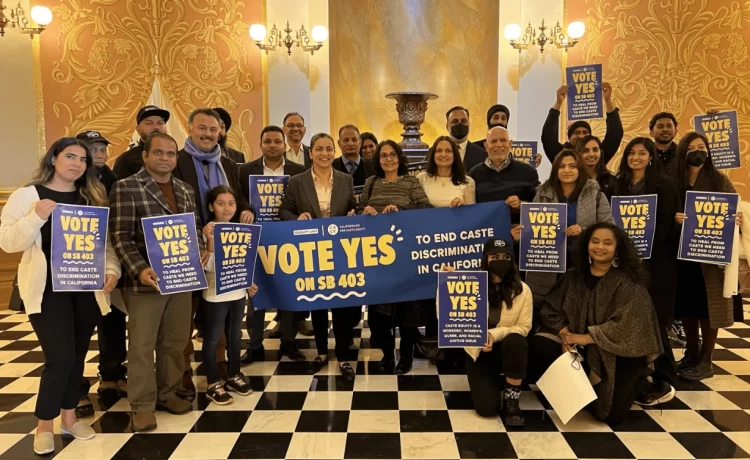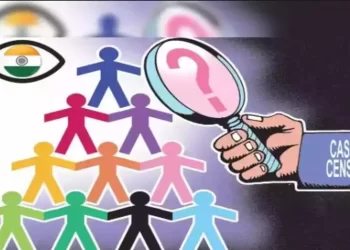Sandeep Yadav
Caste discrimination is a form of prejudice and oppression based on the hierarchical system of caste, which originated and evolved in India and other South Asian countries. Caste discrimination affects millions of people worldwide, especially those who belong to the marginalised communities, who are considered to be at the bottom of the caste hierarchy and face social exclusion, violence, and exploitation.
Today, the California Assembly passed Senate Bill 403 with a 50-3 vote, broadening legal protections for caste-oppressed communities throughout the state. The historic legislation will revise California’s Unruh Civil Rights Act, Education, and Housing codes by adding caste as a protected category under “ancestry.” SB403 is a bill introduced by California Senator Aisha Wahab on February 9, 2023, to amend the state’s anti-discrimination laws by adding caste as a protected category.
The bill aims to address the issue of caste discrimination in California, which is home to a large and diverse South Asian population, many of whom work in the tech industry. According to a 2018 survey by Equality Labs, a civil rights organisation, two out of three South Asian workers reported facing caste prejudice at their workplace in the US.
One of the most prominent cases of caste discrimination in the US was filed by the California Civil Rights Department against Cisco and two of its engineers, Sundar Iyer and Ramana Kompella, in July 2020. The lawsuit alleged that the two engineers discriminated against and harassed a Dalit employee based on his caste, resulting in lower pay, fewer opportunities, and retaliation. A court order dismissed the case against the two engineers in April 2023, but the case against Cisco as a company remains ongoing.
Another tech giant that has faced allegations of caste discrimination is Google. In August 2022, The New Yorker published an article that revealed how Google employees experienced caste bias and harassment from their colleagues and managers. The article also mentioned how Google’s diversity and inclusion policies did not address caste as a protected category, and how some employees felt silenced and marginalised when they tried to raise awareness about caste issues within the company.
Caste discrimination in the tech industry is not limited to Cisco and Google. According to Equality Labs, an organisation that advocates for Dalit rights and justice, they have received complaints from more than 250 tech workers who faced caste bias and hostility in their workplaces. Some of these workers were employed by other big tech companies such as Apple, Facebook, Microsoft, and Netflix.
The bill proposes to add caste as a protected category under the Unruh Civil Rights Act, which provides equal access to public accommodations and services for all people regardless of their sex, race, colour, religion, ancestry, national origin, disability, medical condition, genetic information, marital status, sexual orientation, citizenship, primary language, or immigration status.
The Unruh Civil Rights Act is a law that was passed in California in 1959 to protect people from discrimination by businesses and public establishments based on their personal characteristics, such as sex, race, colour, religion, ancestry, national origin, disability, medical condition, genetic information, marital status, sexual orientation, citizenship, primary language, or immigration status. The law was named after its author, Jesse M. Unruh, who was a prominent politician and leader of the California Democratic Party.
The California State bill also seeks to amend the Education Code and the Government Code to prohibit caste discrimination in public schools and programmes, as well as in employment and housing. The bill defines caste as “a hereditary classification that is historically associated with a traditional system of social stratification characterized by endogamy and notions of purity and pollution.”
The bill has received support from various civil rights groups, activists, academics, and lawmakers who believe that caste discrimination is a serious human rights violation that needs to be addressed by legislation. The bill has also faced opposition from some South Asian organisations and individuals who claim that the bill is based on biased and unproven data, that it targets Hindu communities and other people of colour, and that it infringes on religious freedom and cultural diversity. The bill had previously passed the California State Senate on May 11, 2023, with a vote of 25-11.
Caste discrimination is a serious human rights violation that affects the dignity, equality, and freedom of millions of people around the world. It is important to recognise and challenge caste discrimination wherever it occurs, and to ensure that all people are treated with respect and fairness regardless of their caste identity.
Sandeep Yadav is an associate professor at the University of Delhi.
Courtesy: https://thesatyashodhak.com/the-story-behind-californias-caste-discrimination-bill/









